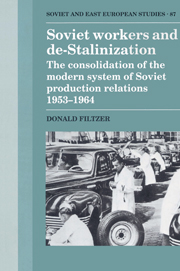 Soviet Workers and De-Stalinization
Soviet Workers and De-Stalinization Book contents
- Frontmatter
- Contents
- List of tables
- Preface and acknowledgements
- List of terms and abbreviations
- Introduction: the contradictions of-Stalinization
- Part I Labour policy under Khrushchev: issues and results
- Part II De-Stalinization and the Soviet labour process
- 5 The historical genesis of the Soviet labour process
- 6 Limits on the extraction of the surplus
- 7 The position of women workers
- 8 Skill, de-skilling, and control over the labour process
- Conclusion
- Notes
- Bibliography
- Index of industrial, mining, and construction enterprises
- General index
- Soviet and East European Studies
8 - Skill, de-skilling, and control over the labour process
Published online by Cambridge University Press: 29 January 2010
- Frontmatter
- Contents
- List of tables
- Preface and acknowledgements
- List of terms and abbreviations
- Introduction: the contradictions of-Stalinization
- Part I Labour policy under Khrushchev: issues and results
- Part II De-Stalinization and the Soviet labour process
- 5 The historical genesis of the Soviet labour process
- 6 Limits on the extraction of the surplus
- 7 The position of women workers
- 8 Skill, de-skilling, and control over the labour process
- Conclusion
- Notes
- Bibliography
- Index of industrial, mining, and construction enterprises
- General index
- Soviet and East European Studies
Summary
The Braverman debate
One of the essential arguments of this book has been that the labour process within Soviet industry plays a fundamental (although in no way exclusive) role in defining the society's overall system of production. Implicit in this argument is the idea that, if this system of production is historically unique and different from capitalism, then so, too, are its labour process and the underlying relations between workers, managers, and the ruling elite (ruling class) within production. This does not mean that the labour processes (for the labour process, as we have seen, is by no means identical from one branch of production to another) within Soviet industry do not share many common features with the labour processes observed under capitalism. I have argued that, on the contrary, the survival and eventual promotion of capitalist technology and forms of industrial organization and management in the 1920s were a major factor which weakened the post-revolutionary Soviet working class and paved the way for Stalinism. Many of the forms of work organization and defensive practices developed by Soviet workers on the shop floor are also found in capitalist factories, although not as universally and systematically as they occur in the USSR. More to the point, because the overall economic and political context in which they take place is fundamentally different between the two systems, the meaning of these practices also differs.
- Type
- Chapter
- Information
- Soviet Workers and De-StalinizationThe Consolidation of the Modern System of Soviet Production Relations 1953–1964, pp. 209 - 230Publisher: Cambridge University PressPrint publication year: 1992
